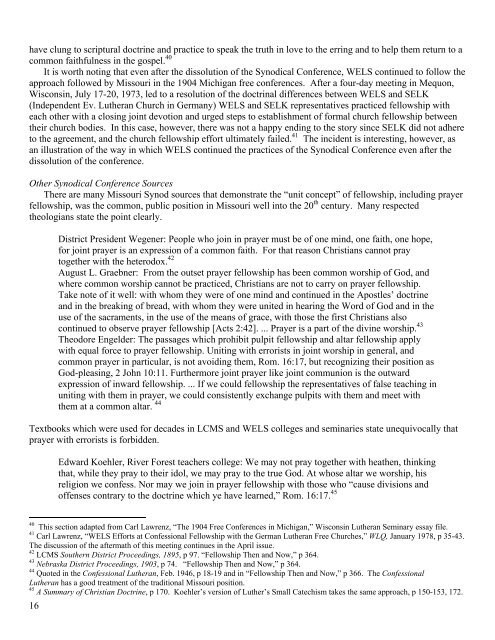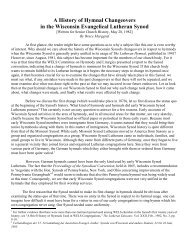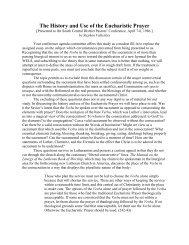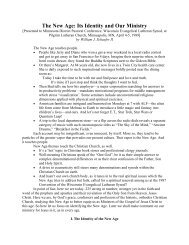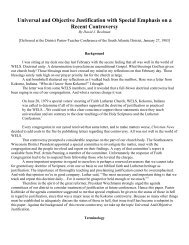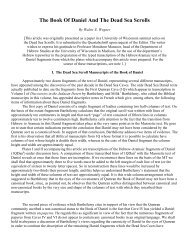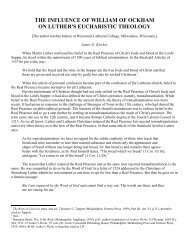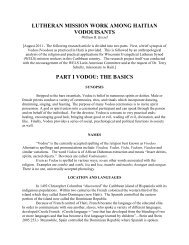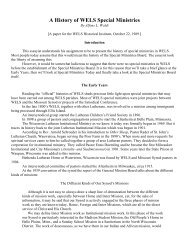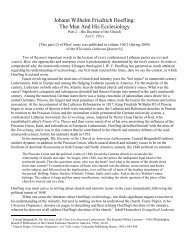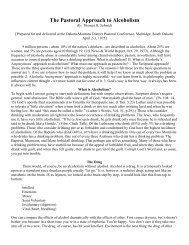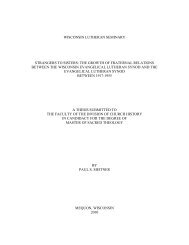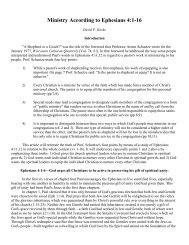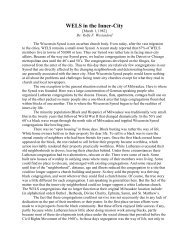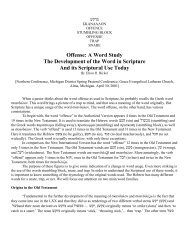The Synodical Conference and Prayer Fellowship - Wisconsin ...
The Synodical Conference and Prayer Fellowship - Wisconsin ...
The Synodical Conference and Prayer Fellowship - Wisconsin ...
You also want an ePaper? Increase the reach of your titles
YUMPU automatically turns print PDFs into web optimized ePapers that Google loves.
have clung to scriptural doctrine <strong>and</strong> practice to speak the truth in love to the erring <strong>and</strong> to help them return to a<br />
common faithfulness in the gospel. 40<br />
It is worth noting that even after the dissolution of the <strong>Synodical</strong> <strong>Conference</strong>, WELS continued to follow the<br />
approach followed by Missouri in the 1904 Michigan free conferences. After a four-day meeting in Mequon,<br />
<strong>Wisconsin</strong>, July 17-20, 1973, led to a resolution of the doctrinal differences between WELS <strong>and</strong> SELK<br />
(Independent Ev. Lutheran Church in Germany) WELS <strong>and</strong> SELK representatives practiced fellowship with<br />
each other with a closing joint devotion <strong>and</strong> urged steps to establishment of formal church fellowship between<br />
their church bodies. In this case, however, there was not a happy ending to the story since SELK did not adhere<br />
to the agreement, <strong>and</strong> the church fellowship effort ultimately failed. 41 <strong>The</strong> incident is interesting, however, as<br />
an illustration of the way in which WELS continued the practices of the <strong>Synodical</strong> <strong>Conference</strong> even after the<br />
dissolution of the conference.<br />
Other <strong>Synodical</strong> <strong>Conference</strong> Sources<br />
<strong>The</strong>re are many Missouri Synod sources that demonstrate the “unit concept” of fellowship, including prayer<br />
fellowship, was the common, public position in Missouri well into the 20 th century. Many respected<br />
theologians state the point clearly.<br />
16<br />
District President Wegener: People who join in prayer must be of one mind, one faith, one hope,<br />
for joint prayer is an expression of a common faith. For that reason Christians cannot pray<br />
together with the heterodox. 42<br />
August L. Graebner: From the outset prayer fellowship has been common worship of God, <strong>and</strong><br />
where common worship cannot be practiced, Christians are not to carry on prayer fellowship.<br />
Take note of it well: with whom they were of one mind <strong>and</strong> continued in the Apostles’ doctrine<br />
<strong>and</strong> in the breaking of bread, with whom they were united in hearing the Word of God <strong>and</strong> in the<br />
use of the sacraments, in the use of the means of grace, with those the first Christians also<br />
continued to observe prayer fellowship [Acts 2:42]. ... <strong>Prayer</strong> is a part of the divine worship. 43<br />
<strong>The</strong>odore Engelder: <strong>The</strong> passages which prohibit pulpit fellowship <strong>and</strong> altar fellowship apply<br />
with equal force to prayer fellowship. Uniting with errorists in joint worship in general, <strong>and</strong><br />
common prayer in particular, is not avoiding them, Rom. 16:17, but recognizing their position as<br />
God-pleasing, 2 John 10:11. Furthermore joint prayer like joint communion is the outward<br />
expression of inward fellowship. ... If we could fellowship the representatives of false teaching in<br />
uniting with them in prayer, we could consistently exchange pulpits with them <strong>and</strong> meet with<br />
them at a common altar. 44<br />
Textbooks which were used for decades in LCMS <strong>and</strong> WELS colleges <strong>and</strong> seminaries state unequivocally that<br />
prayer with errorists is forbidden.<br />
Edward Koehler, River Forest teachers college: We may not pray together with heathen, thinking<br />
that, while they pray to their idol, we may pray to the true God. At whose altar we worship, his<br />
religion we confess. Nor may we join in prayer fellowship with those who “cause divisions <strong>and</strong><br />
offenses contrary to the doctrine which ye have learned,” Rom. 16:17. 45<br />
40 This section adapted from Carl Lawrenz, “<strong>The</strong> 1904 Free <strong>Conference</strong>s in Michigan,” <strong>Wisconsin</strong> Lutheran Seminary essay file.<br />
41 Carl Lawrenz, “WELS Efforts at Confessional <strong>Fellowship</strong> with the German Lutheran Free Churches,” WLQ, January 1978, p 35-43.<br />
<strong>The</strong> discussion of the aftermath of this meeting continues in the April issue.<br />
42 LCMS Southern District Proceedings, 1895, p 97. “<strong>Fellowship</strong> <strong>The</strong>n <strong>and</strong> Now,” p 364.<br />
43 Nebraska District Proceedings, 1903, p 74. “<strong>Fellowship</strong> <strong>The</strong>n <strong>and</strong> Now,” p 364.<br />
44 Quoted in the Confessional Lutheran, Feb. 1946, p 18-19 <strong>and</strong> in “<strong>Fellowship</strong> <strong>The</strong>n <strong>and</strong> Now,” p 366. <strong>The</strong> Confessional<br />
Lutheran has a good treatment of the traditional Missouri position.<br />
45 A Summary of Christian Doctrine, p 170. Koehler’s version of Luther’s Small Catechism takes the same approach, p 150-153, 172.


